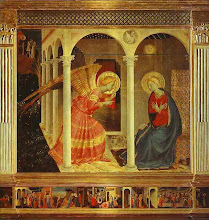For My Protestant Brothers and Sisters
I have been thinking recently, quite often, actually, that though we (and here I am speaking of my friends, not at all a random swathe of people) are on different sides of many social issues, we are not that different in our desire to love, and to be decent human beings. Many of our current political leaders I credit with the same desires. Though with politics, there are always the added factors of political deal-making, political grand-standing, pressures from financial backers, world opinion, and more, that politicians face. So a vote cast in one direction might not reflect the deepest desire of the politician himself or herself , but the compromise reached , tinged with something much less than holiness. And the process such a person goes through to cast that muddy vote is not really open to public view. So I try not to judge harshly. And I don't judge my friends either, even if I think some are ill informed, or are, as my mom used to say, barking up the wrong tree. (Have you ever thought about that expression," barking up the wrong tree"? What exactly does it mean to bark up the right tree? Is that the tree where the squirrel really is hiding that you so desperately want to flush out? And do dogs ever get that wrong? My dog never does... her sense of where the squirrels are hiding is impecable.)
Catholics spend a fair amount of time asking themselves if they are living holy lives. Holiness is the point of living, after all. We receive the body and blood of Jesus Christ at mass expressly so we can be deified, made more and more like God himself insofar as a creature can resemble God, made in his image and likeness. And that is our greatest joy. Life with God! It is a tangible joy, one that is recognized for what it is, and received with humble thanks.
I know many Evengelical protestants who know that joy as well. God does not stint when he seeks friendship with his creatures. But I also know many sincere and devoted Christians who do not consciously seek what we call friendship with God. And this could be one cause of the rift between Catholics and Protestants.
If God is thought to be our creator, our redeemer and our sustainer, as my old Congregational friends said, and here they are not wrong, mind you, but is at the same time understood to be only up in the sky somewhere waiting for us to enter heaven through the pearly gates, then all sorts of things can go wrong faith wise. What God did in the person of Jesus when he lived and died and rose again becomes a sort of legacy, a treasure from the past that we try to appropriate for ourselves, often with little success. And attempts to describe that legacy can become formalized as a set of guidelines, or rules. The Ten Commandments, or hell. Be kind or hit the road. Don't mess with someone else's husband or risk being branded an adulterer and wear an A on your dress to display your shame.
I have known very nice people who believe that is what Catholicism is, at heart, a set of rules that you break at your peril. I remember meeting a lovely man one summer at Chautauqua Institution, where I go to visit my parents. He was there with his wife, both of them Catholics, but he with a distant relationship to his faith. We talked about why he felt this way, and he mentioned rules that he couldn't abide. Fasting on Fridays particularly stuck in his craw.
"But do you know why we fast on Fridays?" I asked. ( I was not being pushy or obnoxious, I promise, this all came about very naturally.)
"It is to help us recall the sacrifice of God's own son, and further, to unite ourselves to that sacrifice."
Such a recollection only really makes sense in light of the mass itself, where something extraordinary is going on. Far from remaining a distant God who leaves us on earth to make our poor way, Catholics understand that God is actually present at mass, offering himself to us for holy food, and in so doing enlivening us so that becoming holy is a work God does in us, with our co operation.
I can say more about this in another post, but for now, does the difference in our churches start to make sense? We have a fundamental choice in faith life.
We can understand ourselves to be moral agents who live life as best we know how, fed by scripture, and sermons, and moral upbringing, or we can understand ourselves to be vessels into which God pours his grace and invites us to co operate with that grace. When I do something pleasing to others, I know for certain that it was mostly God working in me.
And when I screw up, a regular feature of my life, I can receive the sacrament of confession, where I am forgiven and given more grace for a renewed walk with God, in holy friendship.
I cannot imagine life without friendship with God, certainly not religious life, and really, not any kind of life at all. Learning and desiring holiness gives meaning and purpose to every moment of human existence.
In the coming days I want to continue with these thoughts but for now perhaps I've said enough.
Love God with your heart, soul, mind and strength, and love your neighbor as yourself. And do that with the help of God, for without that we will surely fail.
Come Lord Jesus, be our guest.

No comments:
Post a Comment